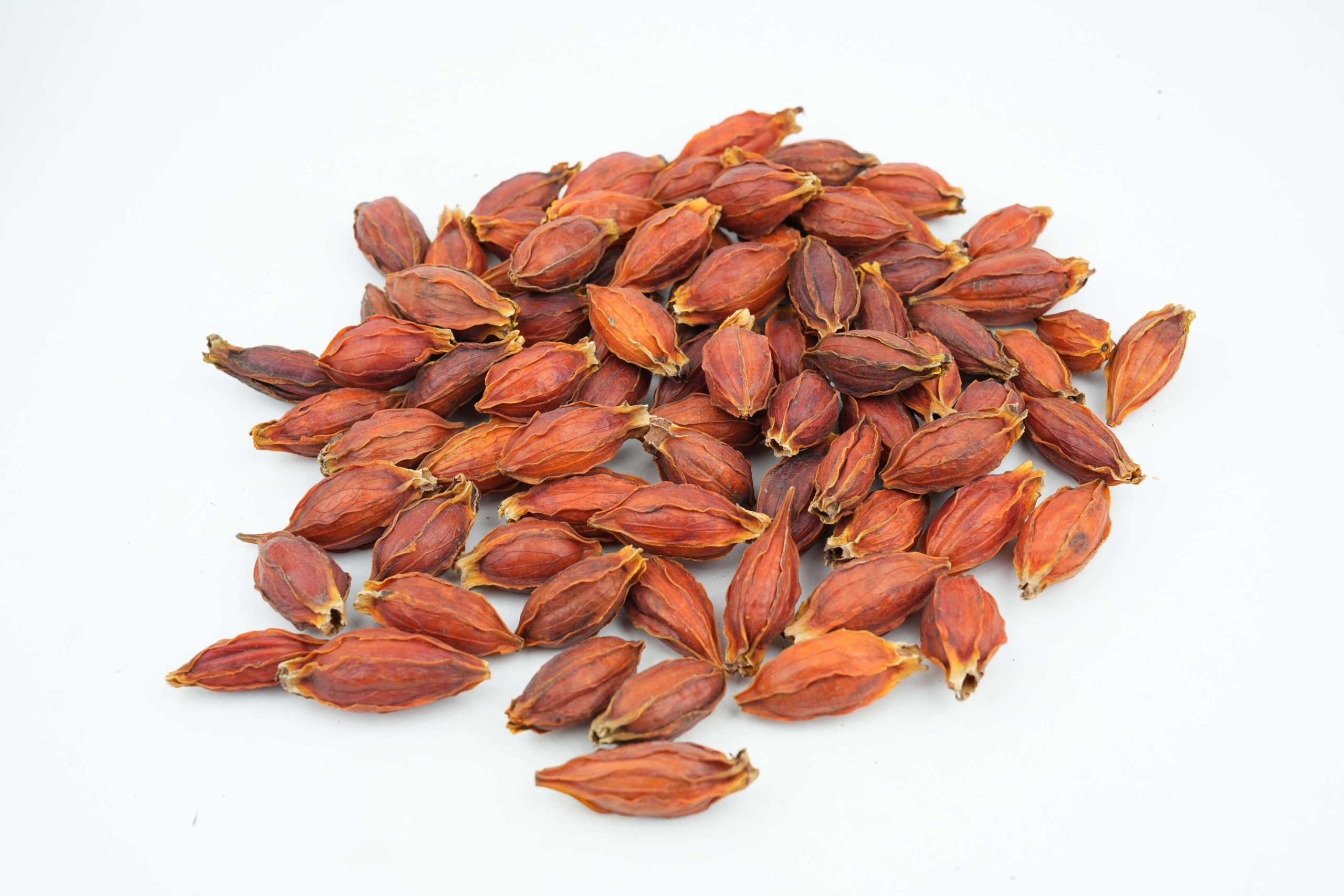 General Details
General Details
Product name: Gardenia jasminoides fruit extract
Plant latin name: Gardenia jasminoides
Product specifications: Geniposide 10%, 30%, 80%, 98% HPLC
Appearance: From brown to white powder
Geniposide, also known as gardenia glycoside, belongs to the iridoid glycosides. It is extracted and refined from the dried mature fruit of Gardenia jasminoides, a Rubiaceae plant. It is one of the first medicinal and edible resources promulgated by the Ministry of Health. It has the effects of anti-inflammatory and choleretic, lowering blood sugar, protecting the myocardium, reducing oxidative damage to vascular endothelial cells, and inhibiting the formation of cholesterol stones. Its main medicinal ingredient, geniposide, and its hydrolyzate Genipin are the material basis for the Gardenia fruit’s various biological and pharmacological activities. They are the direct precursors of the industrial production of Gardenia blue pigment. As a resource-rich and natural non-toxic chemical, geniposide and its hydrolyzate have extremely high medicinal and edible value and broad application prospects, with the discovery and in-depth research of new uses and functions.
Health benefits
Promote bile secretion
Geniposide can also reduce blood bilirubin and promote the rapid excretion of bilirubin in the blood. It has an inhibitory effect on hemolytic streptococci and dermatophytes. It has antipyretic, analgesic, sedative, antihypertensive, and hemostatic effects. It purges fire, eliminates troubles, clears heat and dampness, cools blood detoxifies, reduces swelling, and relieves pain. It is mainly used to treat febrile diseases with restlessness, high fever, irritability, coma and delirium, jaundice with red urine, hot stranguria, and pain, blood-heat vomiting and epistaxis, red and swollen eyes, fires poisonous sores; external treatment of sprains and contusions.
Hypoglycemic and lipid-lowering effects
Studies have found that geniposide can significantly reduce blood sugar and improve glucose tolerance in diabetic model rats. Glucose consumption tests showed that geniposide can significantly promote the absorption of glucose by preadipocytes. The hypoglycemic effect of geniposide in vivo and in vitro may be related to the activation of PPARγ. The blood-lipid-lowering effect of geniposide is still controversial. Some studies believe that geniposide does not affect blood lipids, while others believe that it achieves the lipid-lowering effect by promoting bile secretion.
Anti-thrombotic and fibrinolytic effects
Studies using bypass circulation thrombosis models and common carotid artery thrombosis models have shown that geniposide and its aglycone can significantly prolong coagulation and bleeding time, and reduce thrombus weight in the two thrombosis models. Studies have also shown that geniposide and its metabolite genipin can substantially delay the occlusion time of femoral artery thrombosis in rats and inhibit the activity of phosphatidase, which is the mechanism of anti-platelet aggregation.
Treatment of osteoarthritis
Studies have found that geniposide can promote the proliferation of ligament fibroblasts and tissue repair and healing of ligament injuries. The external application of gardenia extract has achieved good results in treating osteoarthritis. After using gardenia extract to intervene in a rabbit knee osteoarthritis model, it was found that the histological score of the osteoarthritis animal model was improved. Researchers used the method of culturing rat chondrocytes in vitro and found that gardeniposide can regulate the cartilage cell cycle and promote chondrocyte proliferation.
Research has found that gardenia water extract and geniposide can promote the proliferation of fibroblasts and the synthesis of collagen, which is consistent with the clinical effect of gardenia in treating sprains and contusions.
Sedative and hypnotic effect
The sedative and hypnotic effect of geniposide is still controversial. Studies have found that geniposide has no obvious improvement effect on sleep, but the yellow pigment in gardenia has the impact of improving sleep. Studies have also found that high-dose geniposide can shorten the time for experimental animals to fall asleep and increase the sleep rate of experimental animals.
Anti-tumor effect
The aglycone of geniposide can inhibit the growth of mouse leukemia P388 cells and has an anti-cancer effect on rat tumor models by inhibiting the carcinogenic impact of sublethal X-rays and reducing the damage of high-intensity harmful X-rays to cells. 5-acetyl geniposide has an inhibitory effect on the expression of phosphoinositide 3-kinase protein and the phosphorylation of extracellular signal-regulated kinase 1 and extracellular signal-regulated kinase 2, and at the same time shows an activation effect on NF-kβ, c-Fos, and c-Jun, indicating that 5-acetyl geniposide can effectively inhibit tumor cell metastasis.
Applications
Cosmetics
Because the antioxidant properties of geniposide can effectively inhibit the production of free radicals and delay the skin aging process, it is often used in various skin care products to improve skin elasticity and gloss;
Food and spices
Because of its unique aroma characteristics, it is widely used in food seasoning to improve the taste and flavor characteristics of food.
Pharmaceuticals
Geniposide has significant effects in clearing away heat and detoxifying, cooling blood and detoxifying, and is widely used in traditional Chinese medicine. In addition, it can also be used as an antibacterial agent to prevent and treat certain infectious diseases.
